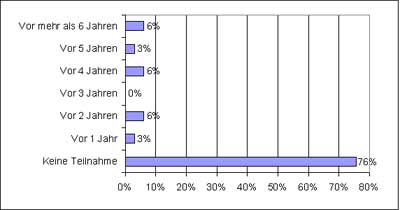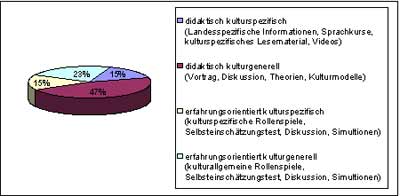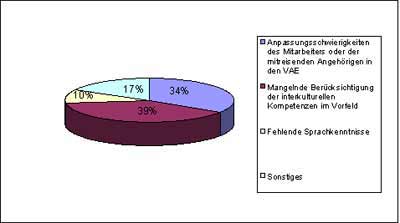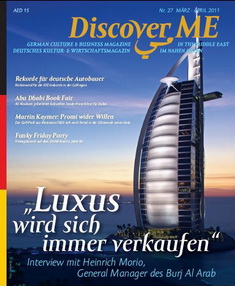
Article:
ISSUE No.2 January-February 2007
German-Arab Business Relationships
Intercultural Negotiation Competence as an Economic Success Factor
by Silvana Hutterer
Through the continuous economic boom in the United Arab Emirates (UAE), the sheikhs have created two economic metropolises within a few years in Dubai and Abu Dhabi, which grow by 10% annually. This has contributed to the fact that an increasing number of German companies and their employees decide to settle there and develop business relationships. In addition to the Emirate population, people from very different cultural circles, such as India, Pakistan, the Philippines, Bangladesh and Germany, live in the UAE. They all have to learn to communicate with one another, whereby mostly the economic interests of the companies are prominent.
It is precisely in such an international environment that knowledge of foreign languages, cultures and living conditions becomes all the more important as a success factor for long-term business relationships. Consequently, acquiring intercultural skills and commercial competencies should be considered a central responsibility of the management for companies in the UAE.
Due to the contacts I gathered during my internship at the Chamber of Foreign Trade in Dubai in 2003, I had the opportunity to implement my diploma thesis in Dubai in collaboration with the Chamber of Foreign Trade and the German Business Council. I would like to take this opportunity to thank especially Dr. Friedrich, the Chamber of Foreign Trade and the GBC in Dubai once again.
The title of the empirical study reads “Intercultural Communication Ability and Negotiation Competence as a Success Factor in German-Arab Business Relationships Using the Example of the UAE”. The target group of the study was German managers and employees of various companies based in the UAE which promote contact with Arab managers and business partners. In all, questionnaires were sent to approx. 250 companies in Dubai and 150 companies in Abu Dhabi. The return quota was 9%. 76% of those asked were managers and have very close Arab business partners; the remaining 24% were either skilled workers or others, such as self-employed. For 28% of the Germans asked, the motives for settling in the UAE included the attractive working environment and the good economic situation and market development in the UAE. Other reasons named were professional transfers, a personal challenge, interesting town and culture, invitation or the foundation of a subsidiary.
The interviewees could be divided into two groups for the purposes of the study: the first group had undergone intercultural training. This group comprised 24% of the interviewees. In addition to an information trip to the UAE or talks with people who had returned, the preparatory measures included an especially developed intercultural preparation seminar for the UAE. The other group, which comprised 76% of the interviewees, was sent to the UAE without intercultural preparation. Of the 24% trained interculturally, one half took part in an in-house seminar and the other half took part in an external preparatory seminar. In all, 50% of the participants could still remember the content of the seminar well. Equally, 50% of the participants confirmed that the seminar had helped them to overcome prejudices or even avoid forming them in the first place. For 37.5% of the interviewees, the seminar contributed towards avoiding making mistakes in the initial phase as they had been trained beforehand.
The results of the questionnaire revealed clear differences between management practices in the UAE and Germany. Differences in the work attitude, perception of time or management behaviour were cited as causes of comprehension difficulties with corresponding negative effects on the business relationships.
As my empirical study confirms, one reason for the lacking sensitivity in German-Arab relationships in the UAE is the non-existent or insufficient intercultural preparation of the employees affected. The preparation of the interviewees, which is normally restricted to information visits, could represent a possible cause of poor adaptation and misunderstandings. Furthermore, it revealed that problems often occur with regard to the adaptation of the spouses of employees sent abroad. This is often the reason for the failure of a business relationship or operation abroad. Other reasons named were the inadequate communication with local clients and erroneous expectations on the part of the original company in Germany. Equally, the reasons for a commercial failure included the acceptance of cultural differences, lack of tolerance and inflexibility with regard to their own behavioural pattern and arrogant and supercilious behaviour towards Arab business partners.
In the study, the interviewees were asked which cultural differences were the biggest and most significant for Germans in the UAE. Religion, making decisions and solving problems, as well as the different perception of time were cited as the main differences. The directness of Germans compared to Arabs was also mentioned. The difference between German and Arab practices in fostering social contacts and winning trust in the context of a lengthy process proved to be most significant. It could be proved that the participants develop intercultural negotiating competencies through purposeful measures, in spite of the limitations of cultural training which especially lie in the participants’ will to learn and motivation. As a result, they find intercultural interaction less difficult, do not experience such a big culture shock and generally work more effectively than someone who has not had any training.
To sum up, it can be recorded that intercultural training as preparation for a placement abroad is indispensable. This is an important prerequisite for a successful collaboration, particularly for Germans who are planning a sojourn in the UAE or seeking business relationships with Emirates. After all, Germany is becoming increasingly dependent upon new markets as an export country, whereby the United Arab Emirates seem to be particularly attractive for German companies as a booming economic location.
Participation of the Interviewees in an Intercultural Preparatory Seminar

Differences in Intercultural Preparatory Seminars

Possible Reasons for Failure between German and Arab Business Partners

